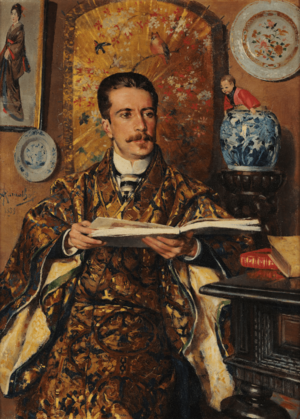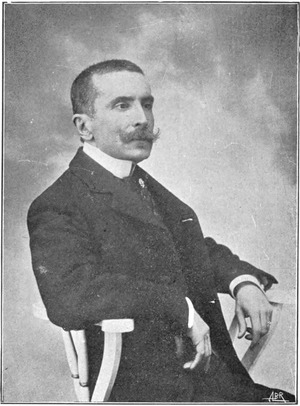Abel Botelho facts for kids
Quick facts for kids
Abel Botelho
|
|
|---|---|
 |
|
| Born |
Abel Acácio de Almeida Botelho
23 September 1855/1856 Tabuaço, Portugal
|
| Died | 24 April 1917 (aged 60-61) |
| Nationality | Portuguese |
| Occupation | Diplomat, writer, general, politician, journalist, playwright, novelist and historian |
Abel Acácio de Almeida Botelho (born September 23, 1855 or 1856 – died 1917) was a famous Portuguese military officer and diplomat. He became very well-known as a writer. He was a key figure in a writing style called Naturalism in Portugal. Some of his most famous books include O Barão de Lavos and O Livro de Alda. These were the first two books in his "Patologia Social" series. In 1911, he helped choose the design for what is now the flag of Portugal.
Contents
Life Story of Abel Botelho
Abel Botelho was born in Tabuaço, a small town in Portugal. His father, Luís Carlos de Almeida Botelho, was an army major and a teacher. His mother, Maria Preciosa de Azevedo Leitão, came from a family of wealthy farmers. Abel's father wanted him to go to university. However, his father passed away when Abel was only 12 years old. This changed Abel's path in life.
Early Education and Military Career
As a teenager, Abel attended the Military College in Lisbon. He studied there from 1867 to 1872. After that, he went to Escola Politécnica de Lisboa until 1876. From 1876 to 1878, he studied at the military academy. He started his army career as a simple private soldier. But he worked his way up to become a colonel, which is a very high rank. In 1881, he married a woman from a noble family.
Important Roles and Diplomacy
Abel Botelho held many important jobs. He was the chief of staff for the First Military Division in Lisbon. He also belonged to several important groups. These included the Academy of Sciences and the Geographical Society of Lisbon.
In 1911, he became the Minister of Portugal in Buenos Aires, Argentina. This was a very important job at the time. Some people say his work helped Argentina become the first country to officially recognize the Portuguese Republic. This happened after the republican government was set up in 1910. He continued to work for the Ministry of Foreign Affairs in Argentina. He stayed in this role until he passed away in 1917, during World War I.
Abel Botelho's Writings
Abel Botelho started his writing journey in 1885. His first book was a collection of poems called Lira Insubmissa.
Plays and Theater Works
The next year, he wrote a play called Germano. It was a drama with five acts, written in verse. He offered this play to the National Theater, but they did not accept it. Abel Botelho then wrote an article about their decision. This caused a bit of an argument. After that, he wrote many other plays:
- Jacunda (a comedy from 1895)
- Claudina (a comedy performed in Lisbon in 1890)
- Vencidos da Vida (a satirical play performed in 1892)
- Parnaso (a lyrical play from 1894)
- Fruta do Tempo (a comedy written in 1904)
His plays often talked about sensitive or difficult topics, as was common for the Naturalism style of writing. This sometimes caused strong reactions. For example, Imaculável led to riots. Vencidos da Vida was even stopped from being performed. This was because it criticized a literary group and was seen as inappropriate by some. This led to another argument between Botelho and those who banned his play.
Novels and Social Studies
In 1891, Abel Botelho began a special series of books called "Patologia Social." In these books, he studied Portuguese society in a very detailed way. He looked at the problems that affected Portugal, especially in Lisbon, the capital city.
The first book in this series was O Barão de Lavos (1891). It is thought to be the first Portuguese novel to include a homosexual character. Other books in this series were:
- O Livro de Alda (1898)
- Amanhã (1901)
- Fatal Dilema (1907)
- Próspero Fortuna (1910)
Besides these, he wrote three more novels: Sem Remédio... (1900), Os Lázaros (1904), and Amor Crioulo (published after his death in 1919). He also wrote a short story called Mulheres da Beira (1898). This story was later used as inspiration for a film in 1921. Abel Botelho also contributed to several magazines. These included Brasil-Portugal, Serões, Azulejos, and Atlântida.
See also
 In Spanish: Abel Botelho para niños
In Spanish: Abel Botelho para niños


